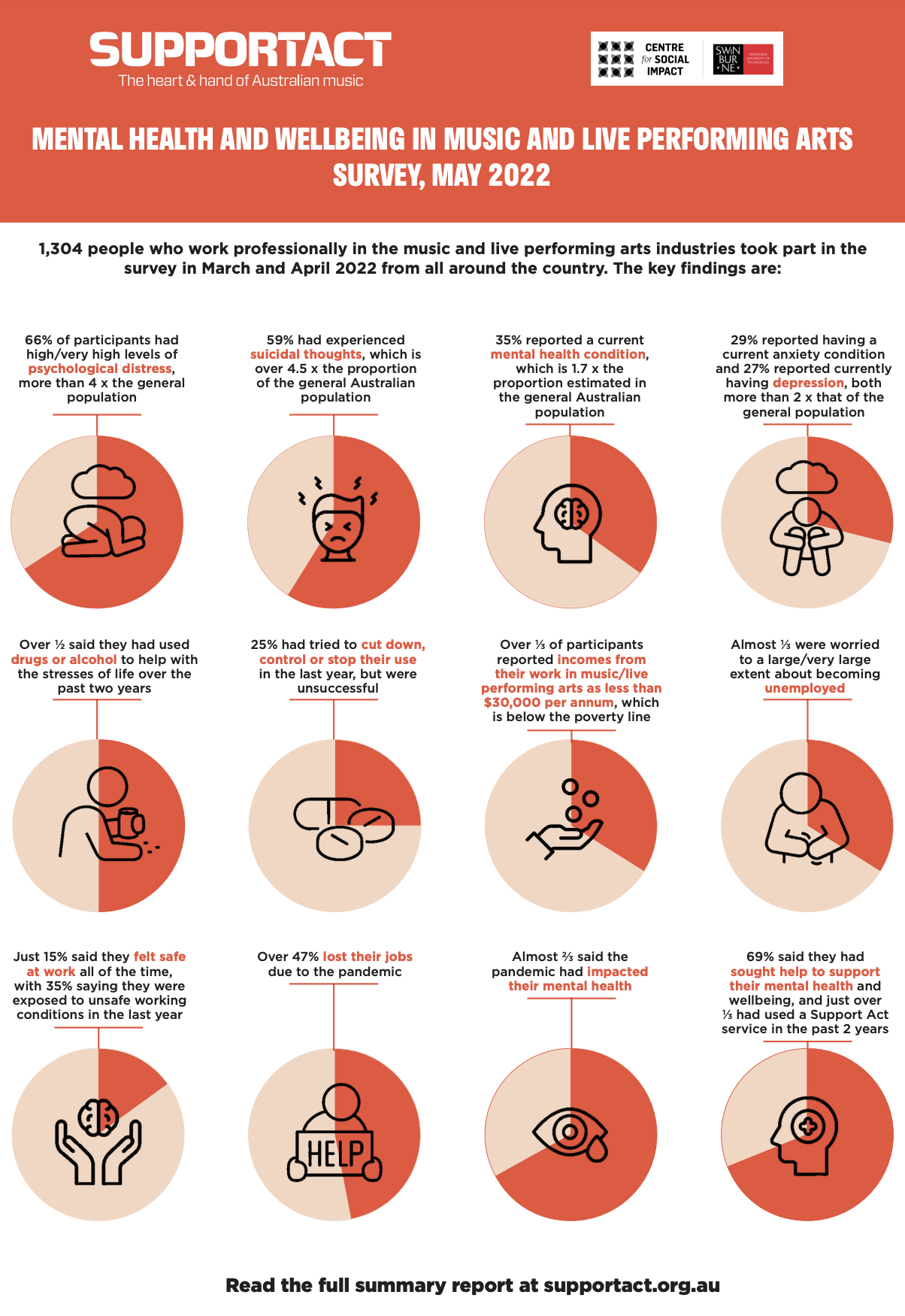Full Extent of Music Industry’s Mental Health Crisis Revealed

Photo by Marcel Strauß on Unsplash
Content warning: This article discusses mental health and sexual harassment. If you or someone you know is affected by this story, you are not alone, to speak to someone, you can call Lifeline on 13 11 14, or 1800 RESPECT on 1800 737 732.
The state of the music and live industries’ mental health has been uncovered by the Mental Health and Wellbeing in Music and Live Performing Arts survey, conducted by Support Act and the Centre for Social Impact Swinburne.
Findings released earlier revealed how the industry felt about their working conditions, including exposure to bullying and unwanted sexual attention, and the lack of job security.
Now, Support Act has unveiled the full findings, including that 66% of the survey’s participants had high or very high levels of psychological distress, more than four-times that of the general population.
This was more common among non-binary people (83%) and women (72%), as well as people under 35 (75%), people with a disability or long-term health condition (81%) and people with a very low income (81%).
35% reported a current mental health condition, which is 1.7-times the proportion estimated in the general Australian population.
In addition, 29% reported having a current anxiety condition and 27% reported currently having depression – both more than two-times the general population’s statistics.
Over half (54%) said they had used drugs or alcohol to help with the stresses of life over the past two years, and 25% said they had tried to cut down, control or stop their use in the past year, but were unsuccessful. 17% said their drug and alcohol use impacted their ability to function well at work or in other activities.
Support Act said on a more positive note, 69% of respondents said they had sought help with their mental health and wellbeing, and 36% had used the services of Support Act in the past two years.
Just over 1,300 people who work professionally in the music and live performing arts industries took part in the survey in March and April this year.
Dr Aurora Elmes, research fellow at the Centre for Social Impact Swinburne, said the research findings indicate that people in music and live performing arts continue to face job insecurity and work environments that can be unsafe for physical and mental health.
“On top of existing issues with working conditions, it reveals the ongoing effects of added stressors arising from the COVID-19 pandemic on people’s work, income, social connectedness and mental health,” Elmes said.
“Participants in this research identified a need for further financial and mental health support for people working in music and live performing arts, as well a need for broader change within the sector and government support to enable this.
“People want to see action towards improved working conditions and work environments that are safe for everyone’s mental and physical health – including addressing identified issues such as ageism, racism, bullying and sexual harassment.”
Clive Miller, CEO of Support Act, noted the gravity of the findings.
“We all know how difficult the past few years have been, but these startling statistics reinforce once again the many and varied challenges that music and arts workers face in pursuing their chosen careers,” he said.
“They also highlight the urgent need to continue to support the mental health and wellbeing of music and arts workers through access to industry-specific psychological services, as well as evidence-based prevention, education and training programs, such as the ones that Support Act provides.
“We hope that governments, industry and music lovers across Australia will continue to support our efforts to help create more mentally healthy workplaces that prioritise psychological safety and wellbeing and that will, in time, see a turn around in these shocking rates of mental ill health.”
Full details about the survey can be found here.
If you or someone you know is affected by this story, you are not alone, to speak to someone, you can call Lifeline on 13 11 14, or 1800 RESPECT on 1800 737 732.
This article originally appeared on The Industry Observer, which is now part of The Music Network.































